Pakistan Tries, And Largely Fails, To Explain Itself
Pakistan is trying to explain how the world's most wanted man was able to hide in plain sight for six years, and failing badly.
The blame game over who may have been responsible for the fact that the world’s most wanted man may have spent the last nine years or so hiding in plain sight in Pakistan has begin:
A senior official in Pakistan’s civilian government told ABC News, “Elements of Pakistan intelligence — probably rogue or retired — were involved in aiding, abetting and sheltering the leader of al Qaeda,” the strongest public statement yet from the Pakistani government after the raid on Osama bin Laden’s compound.
This is based on the government’s judgment that the number of years bin Laden spent in Abbottabad — and it now appears in a village outside the city of Haripur — would have been impossible without help, possibly from someone in the middle tier of ISI, Pakistan’s intelligence agency, who grew up fighting alongside the mujahidin against the Soviets, said the official.
According to the official, the military and ISI have been weeding some of them out but many remain.
Meanwhile, Pakistan’s Prime Minister denied that there was any complicity or incompetence on his country’s part arising out of the bin Laden news:
ISLAMABAD, Pakistan — Pakistani Prime Minister Yousaf Raza Gillani on Monday dismissed allegations that his nation’s failure to locate Osama bin Laden in a military garrison town amounted to incompetence or complicity, calling the assertions “absurd” in an address to the nation’s parliament.
“Yes, there has been an intelligence failure,” Gillani said. But, he said, “it is not only ours but all of the intelligence agencies in the world. The al-Qaeda chief, along with other al-Qaeda operatives, had managed to elude global intelligence agencies for a long time.”
Gillani is the highest-level official in Pakistan’s weak, U.S.-backed civilian government to have spoken publicly on bin Laden’s killing a week ago. He largely reiterated comments made previously by other government and military officials: that Pakistan’s chief spy agency had shared intelligence that led the U.S. commando team to bin Laden’s lair, that Pakistan is committed to fighting terrorism and that it viewed the American helicopter raid as a violation of its sovereignty.
As I noted in a post the day after bin Laden was killed, the ball was in Pakistan’s court to explain exactly how the most wanted man in the world, a foreigner with a distinctive appearance who is, for the region, unusually tall, managed to hide out for as many as six years in the hear of a community heavily populated with present and former Pakistani military officials. Gilliani’s assertion that Pakistan shouldn’t be held responsible for (allegedly) not knowing that bin Laden in their midst because nobody else in the world did is, quite simply, absurd. The only reason the United States figured out where the man was is because of intelligence and good old fashioned detective work. On some level, it simply defies credulity to believe that nobody had any idea what was going on.
Similarly, the “rogue retired elements of the ISI” explanation doesn’t sit well with me either. It seems similarly inconceivable that protecting knowledge of bin Laden’s presence in Abbottabad, and providing him with the support necessary to stay there, can be pawned off merely on a few retired ISI operatives. Clearly, if they were involved, it was because they were using their contacts in the agency to protect bin Laden, so there would almost have to be others involved. While it’s entirely plausible that someone in the ISI could pull this off without the political leadership in Pakistan knowing about it, the assertion that none of them were involved just seems silly.
The question, of course, is how far the United States is willing to push this question given the importance of Pakistan to the war in Afghanistan. Already, there are signs of tension such as the fact that the name of the CIA Station Chief in Islamabad was leaked by the Pakistani media, something that’s considered a serious breach of protocol. Additionally, during today’s White House Press Briefing, Jay Carney acknowledged that the relationship between the U.S. and Pakistan was not one capable of being easily resolved:
Things aren’t great between the United States and Pakistan, but Obama aides said the relationship is too important to give up on.
“The United States and Pakistan have an important, complicated relationship, as we’ve said,” White House spokesman Jay Carney said. “The cooperation that we’ve had with Pakistan has been important for years now in our fight against terrorism and terrorists.”
“And,” Carney added, “more terrorists have been killed on Pakistani soil because of that cooperation than anywhere else in the world, and that’s important to note.”
Carney spoke as the United States investigates whether any Pakistani officials helped protect Osama bin Laden as he lived in their country for at least five years.
Leaving aside terrorism, of course, there’s the fact that Pakistan has about 130 nuclear weapons and still has a tense relationship with its neighbor India, another nuclear power. Political stability inside Pakistan isn’t just important because of its role in the War on Terror, but also because the prospect of a nation with nuclear weapons falling into the hands of people with links to terrorism should concern, well, pretty much everyone.
So, it would seems, we’ve got ourselves quite a little quandry in Pakistan. I’m not sure what the answer is, or even how deeply we ought to be involved there (not much would be my instinct), but you can rest assured we’ll be talking about this place for quite some time to come.
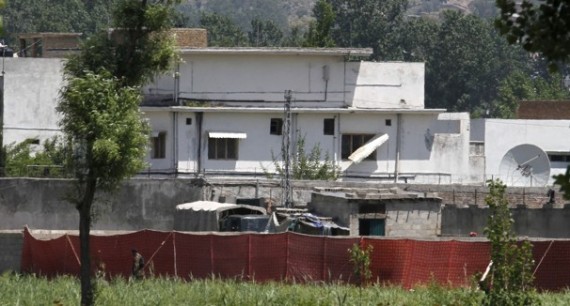

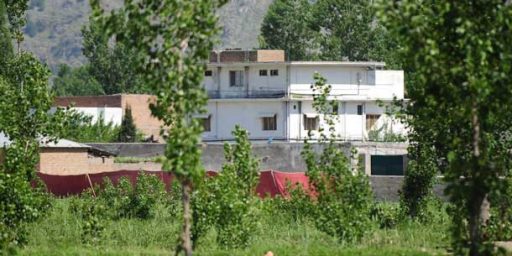
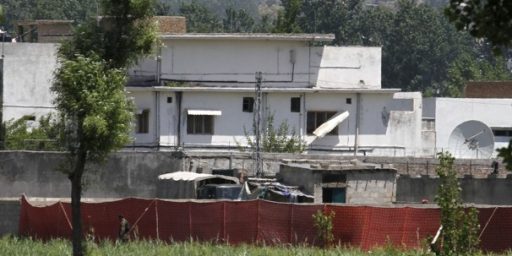
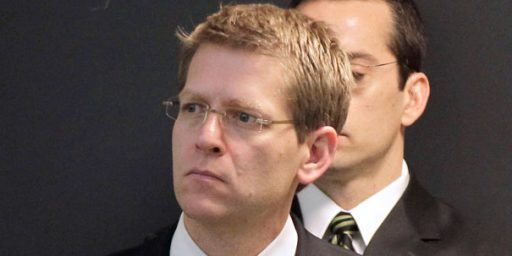
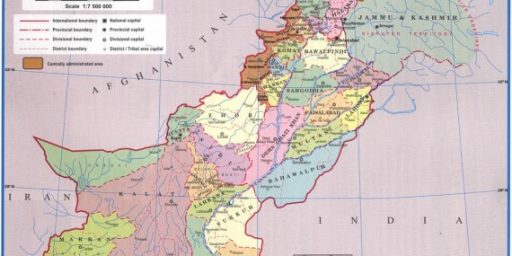

I don’t know, would the guy really have lived life in one apartment if he’d had government protection? On the other hand, if he were more or less independent, I could see him forced into that.
He was not livin’ large like a Bond villain.
” it simply defies credulity to believe that nobody had any idea what was going on.”
Why?
If he never went outside, how would the Pakistanis know where he was?
Because Obama says so!!!!
It is not by any means the first time someone hid in plain sight and\or right under one noses. U.S. troops were even close to him at times.
http://www.tuscaloosanews.com/article/20080722/NEWS/623619749
http://www.nypost.com/p/news/international/beast_hid_in_plain_sight_0S5yoaYHG48MrkwWw6V5iO
http://www.columbiatribune.com/news/2010/sep/19/most-wanted-fugitive-lived-quiet-life-here/
If cutting off aid or even ending cooperation with Pakistan is logistically, politically, or otherwise unfeasible I would strongly suggest another option.
Call India and let them know in no uncertain terms that we share their concerns about their troubling neighbour, and will provide them with full diplomatic and military aid in their struggle with Pakistan and all it’s created and funded terrorists.
Let India take the gloves off.
Doug, this is not hard. Certain individuals within the ISI, knew where OBL was (they were not the gov’t of Packistan) and yes… they gave him protection. Does that mean the gov’t of Pakistan gave him protection???? NOOOOO!!!!!
Let me draw an anology: Valarie Plame was a CIA agent heavily involved in WMD…….
Do I need to draw a picture?
no matter the circumstances, no matter our geopolitical interests, encouraging war between india and pakistan should be the very last thing any reasonable person should advocate. the regional and international implications could very easily be catastrophic.
As I’ve noted before, the problem with all this is treating “Pakistan,” the “Pakistan army,” and “the ISI” as if they were unitary actors when they’re not.
Pakistan isn’t a country in the way that France is. Large swaths of it are essentially autonomous, having next to no connection with the central government.
The ISI is a set of regional fiefdoms, only nominally reporting to the central military and government authorities. What happens in one district stays in that district.
Is it probable that some senior officials in Pakistan more-or-less knew where Osama was? Absolutely. Does that mean that his whereabouts were generally known by the authorities? Not at all.
thank you. if only the media at large were capable of nuance of any kind…
james, given this semi-autonomous relationship between the ISI and islamabad, what is the right response from the state dept, and what does it say about the future of our involvement in afghanistan?